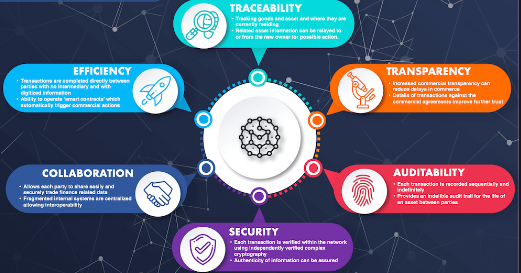Only at first sight, supply chain in logistics seems to be simple: The complexity of modern supply chains results in delays, losses, damages and opens impressive opportunities for fraud. No wonder this industry requires the power of technological transformation which presupposes the implementation of innovative digital technologies such as blockchain.
In one of our blog posts, we have disclosed what blockchain technologies can offer to the logistics industry. Let’s see what blockchain technology can bring to the supply chain.
a blockchain is a decentralized network (chain) of blocks that allows for making, recording, and protecting transactions among several parties involved without the need for an intermediary like a bank.
Each new block is linked to the previous one, so it is impossible to change one block without changing the whole chain without approval from everyone in the network. Cryptocurrencies like Bitcoin, Litecoin, and Ethereum are utilized as the main currency for transactions.
What Are the Benefits of Blockchain in Supply Chain Management?
The use of blockchain in supply chain management can improve supply chain security, transparency, and credibility as well as can help automate the processes while reducing the costs and risks. It allows the participants to record prices, dates, locations, quality, certification, and much other relevant information to manage the supply chain more productively. Blockchain technology can increase traceability of the supply chain, lower losses from the counterfeit and grey market, improve visibility and efficiency, and overall supply chain management.

Security and Transparency
Since the information in each node of a blockchain cannot be lost and changed or erased if someone simply wants it, it becomes a trustworthy way of storing data. Unlike storing the data at servers, the blockchain-enabled database is also hacking resistant as all the information is open and stored at multiple machines.
Since the information in each node of a blockchain cannot be lost and changed or erased if someone simply wants it, it becomes a trustworthy way of storing data. Unlike storing the data at servers, the blockchain-enabled database is also hacking resistant as all the information is open and stored at multiple machines.
Information Credibility
The transparency blockchain brings to the global trade industry goes beyond documentation and administrative procedures. It also shows the information about goods and their origin to ensure dealers and customers that the products are not changed for some fakes along their way to shelves or not produced using illegal child labor. The blockchain-based system can be used to confirm the exclusivity and real origin of luxury goods which are most likely to be faked.
The confirmation of proper production becomes even more important when it comes to drugs or food. With the help of blockchain, it is easy to detect who is responsible for spoiled food or disease outbreak. Imagine a huge retailer importing eggs and chicken from several households. Suddenly consumers report getting salmonellosis after eating the eggs they bought from this retailer. Instead of destroying the whole stock, it is possible to find out the exact providers of contaminated products and get rid of their latest supplement.
One more way the logistics industry benefits from easy-to-access reliable information ensured by blockchain technology is the opportunity to see a vehicle’s history and performance efficiency. For example, when a company needs to buy used trucks, it can get the history of all breakdowns, repairs, and accidents of a particular vehicle.
Processes Automatization
One of the most revolutionizing effects blockchain has on the supply chain industry lies in smart contracts. These are sets of actions that are done after certain requirements are met. For example, this can be a program that sends money to the carrier right after the cargo reaches its final destination. Such a solution helps to eliminate the need for third-party companies like banks, to accelerate and automatize the processes that usually require more time and can cause a human error.

The long and tedious attempts to iron out conflict situations are a serious problem for the majority of players of the logistics industry. Empowered by blockchain, supply chain management can save much time and resources by simplifying settling disputes.
Implementing blockchain in the supply chain also allows simple searching for matching routes and free spaces at vehicles. According to American Transportation Research Institute, 20% of all the distance trucks drive empty. It means losses in the industry’s income, which can be avoided by better communication and automatization of getting information about truck loads.
The Bottom Line
The use and value of any technological innovation in any industry will grow in accordance with the growth of the number of companies using it. At Soft G Tech, we believe that the more logistics market game players adopt blockchain technology, the closer the industry gets to becoming a transparent and reliable ecosystem. And we are ready to help your business get full advantage of the tech revolution that has already started in the supply chain industry.




0 Comments